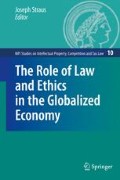‘TRIPS-like’ is a metaphor which readily comes to mind in Munich, the world capital of the community of intellectual property law scholars. What does it stand for? With the Agreement on Trade-related Aspects of Intellectual Property Rights (TRIPS) the WTO established a parallel system of regulatory protection of intellectual property rights - relatively detailed, systematic, based on substantive protection standards and providing for means of enforcement - side by side to the traditional convention system (Paris, Berne, etc). Apart from the institutional and procedural framework, the treaty sets forth substantive standards regarding the availability, the scope and the use of intellectual property rights as well as rules on the private enforcement of those rights, i.e. remedies and procedures available to their holders in cases of violations, which Contracting States have to provide. The underlying rationale is that world trade law does not want to facilitate any trade but only trade in goods and services which are not subsidised, dumped or fruit of the violation of intellectual property rights. However, intellectual property rights, as designed and protected by the TRIPS Agreement, are not absolute. Their content may be shaped and their exercise may be limited with a view to achieving certain economic and social objectives. Articles 7 and 8 of the Agreement, the provisions defining the objectives of the system and its guiding principles, serve at the same time as basis for member States’ authority to embed the ways right-holders may make use of their individual legal position in collectively formulated policies. In other words, this paper is obviously expected to address the fundamental issue of the relationship between private law, and more specifically commercial law, on the one hand and public international trade law and regulatory law on the other hand. It is necessarily also about non-level playing fields in international commerce and finance, a phenomenon a private-law formulating agency such as UNIDROIT encounters routinely in carrying out its mandate.
Access this chapter
Tax calculation will be finalised at checkout
Purchases are for personal use only
Preview
Unable to display preview. Download preview PDF.
Author information
Authors and Affiliations
Editor information
Editors and Affiliations
Rights and permissions
Copyright information
© 2009 Springer-Verlag Berlin Heidelberg
About this chapter
Cite this chapter
Kronke, H. (2009). Does the World Need TRIPS-like Instruments in Other Areas of Commerce and Finance?. In: Straus, J. (eds) The Role of Law and Ethics in the Globalized Economy. MPI Studies on Intellectual Property, Competition and Tax Law, vol 10. Springer, Berlin, Heidelberg. https://doi.org/10.1007/978-3-540-92681-8_11
Download citation
DOI: https://doi.org/10.1007/978-3-540-92681-8_11
Published:
Publisher Name: Springer, Berlin, Heidelberg
Print ISBN: 978-3-540-92680-1
Online ISBN: 978-3-540-92681-8
eBook Packages: Humanities, Social Sciences and LawLaw and Criminology (R0)

